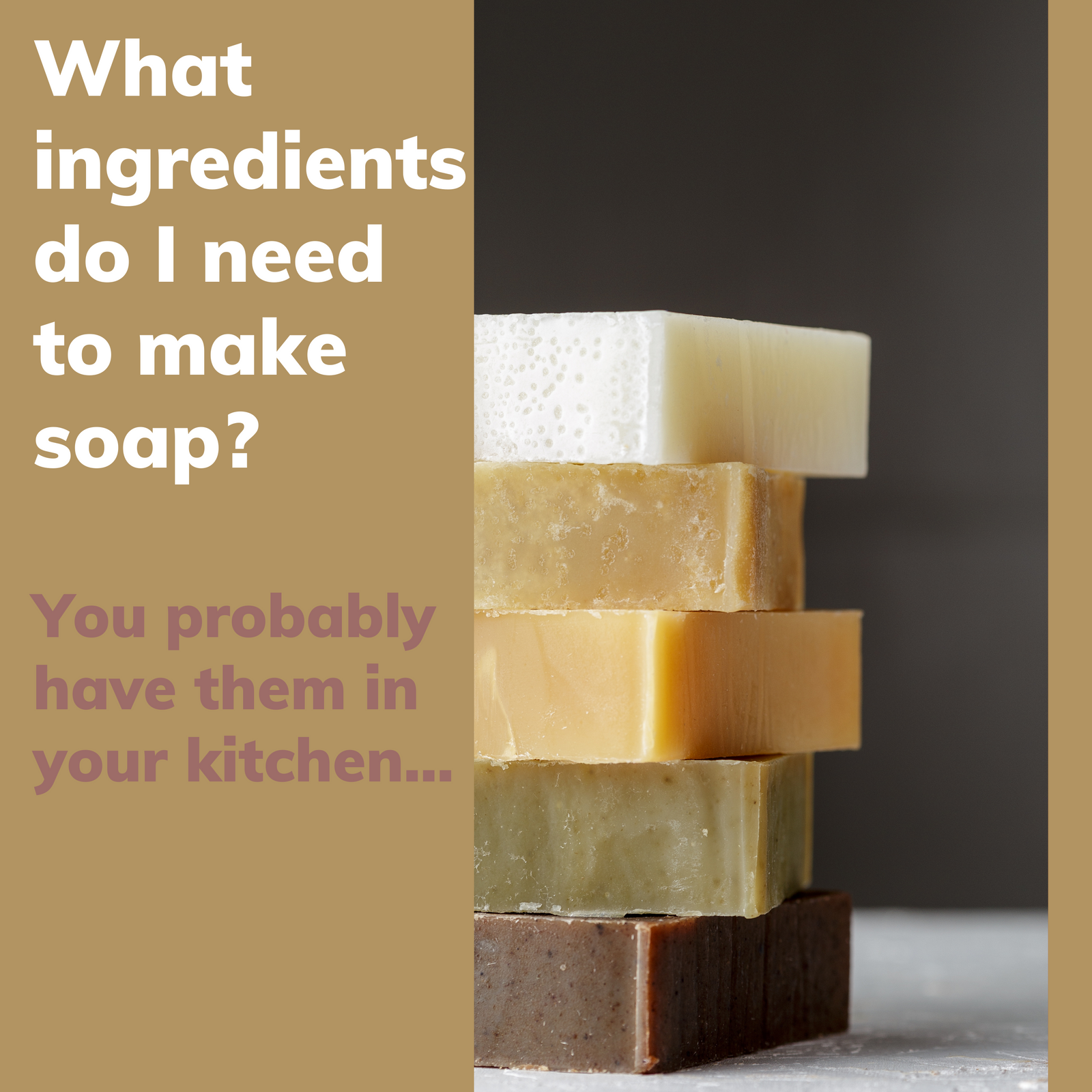What ingredients do I need to make soap?

If you’re looking to make your own soap at home I know researching ingredients and methods might feel a bit overwhelming at first, there is a ton of information out there and not all of it makes a lot of sense. I have been teaching for several years now and have had hundreds of students go through my classes both in person and online so lets simplify this right down and make it easy for you.
In a nutshell, for a very basic soap you need butters and oils, water and sodium hydroxide. You can add essential or fragrance oils for scent and other ingredients for colours, if you fancy being creative but these are all optional.
Key Ingredients for Soap Making
-
Oils & Butters Your choice of base oils are vital for soap texture and quality. Popular choices include olive oil (for mildness), coconut oil (for lather), and cocoa butter (for a hard bar and skin benefits). Others such as caster oil can boost lather but in general all liquid oils contribute towards the gentle, conditioning properties, butters are often moisturising, make a harder bar, some may contribute a little towards lather. Hard oils contribute towards a harder, more cleansing bar. This is a very generic overview, there is a lot more science to it depending upon the fatty acid make up of the butters and oils (you can read more about that in this blog) but for now that gives you an idea of how it works.
-
Sodium Hydroxide (Lye) Essential for saponification (the chemical reaction that turns everything in to soap) , it is not possible to make soap without it. Sodium hydroxide is also used as a drain cleaner (I know that sounds awful but bear with me), it is used in baking too! Bagels spring to mind. In the context of soap making, sodium hydroxide is your alkaline, It's chemical symbol is Na (Sodium), O (Oxygen), H (Hydrogen). After saponification it forms soap salts and glycerin, there is no sodium hydroxide left in the mixture.
-
Water Acts as a carrier to dissolve the lye and incorporate with oils, enabling the chemical reaction that forms soap salts and glycerin.
Optional Additives for Custom Soap
- Essential Oils For fragrance, choose high-quality, skin-safe essential oils.
- Colourants Use clays, botanicals, or natural dyes if you want to add color.
Tips for a Successful Soap Batch
Beginners often stick with simple recipes, in my classes we use a combination of olive oil, coconut oil, and cocoa butter, this creates a balanced, skin-friendly bar that is easy to work with.
My Easy Soap Recipe
If you’re ready to experiment, look into recipes for sensitive skin, or a high-coconut-oil soap for a cleansing bar.
|
Olive Oil 225g Coconut Oil 158g Cocoa Butter 67g Sodium Hydroxide 65g Water 130g You can add up to 13.5g of something like lavender or rosemary essential oil to this, both are good for beginners and will not cause any problems with your soap batter. |
I am also a big fan of a simple coconut oil soap. If you would like a recipe for this you can find it here.
The options however are endless and the internet is littered with recipes ranging from basic to exotic so the sky really is the limit. If you needed a very mild gentle bar of soap for example, you would use a recipe that is high in olive oil. A deep cleaning gardeners or mechanics soap would ideally be higher in coconut oil which is great for lifting the dirt but could be too cleansing for a baby's delicate skin.
Where To Buy Soap Making Ingredients (UK)
I am UK based and buy the bulk of my ingredients from my recommended online suppliers however there is nothing at all to prevent you using oils purchased from supermarkets or online providing they are pure and not mixed with other oils - this would pose a problem as your recipe would not work properly and may end up lye heavy which would mean your soap is caustic and could burn you.
Sodium Hydroxide is readily available from many hardware stores or online but you do need to ensure it is good quality and not blended with anything else.
So in a nutshell.
Soap = water + oils + sodium hydroxide. Simples!
Updated 10/24
Good day colleagues. I am a gentleman from Johannesburg, South Africa 🇿🇦 and I am hundred % interested in knowing more on how to D I Y soaps.
I need to learn how to make soap. I feel this is the right channel.
I love the way you speak in simple terms
Thank you
From your friend in Australia 🇦🇺
Hi Samuel, there are lots of You Tube videos out there which are a good place to start , alternatively do consider signing up for my Mino Soap Suite. It is an online membership with lots of videos and recipes in and I go in to a lot more detail than you may find on You Tube which may be easier for you to work through. It is only £5 a month, more details on that here. https://keri-s-school-52e2.thinkific.com/bundles/the-mini-soap-suite1
Hello I would like to learn more about bar soap making , am interested this but I don’t know where to start
Leave a comment